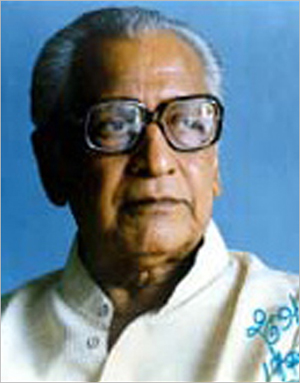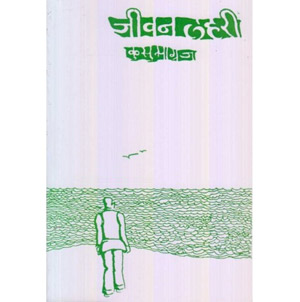 ( 27th February 1912 – 10th March 1999 ) Mr. V V Shirwadkar’s original name was Gajanan Ranganath Shirwadkar. After he was adopted, hisname changed to Vishnu Waman Shirwadkar. He is born in Pune on 27th February 1912 . His primary education was in Pimpalgaon and high school education was in New English School,Nashik, which is now called as J.S. Rungtha High School of Nashik. He passed matriculation from Bombay University. His poems and articles were published in “Balbodhmewa ” magazine edited by the famous poet of Maharashtra D.N. Tilak way back in 1929, when he was hardly 17 years old. . He joined H.P.T. College in 1930 and his poems were then published in “Ratnakar” magazine. In 1932, he participated in the “Satyagraha” for allowing untouchables to enter Kala Ram Temple. Since then the budding poet in im started soaring up in the sky of literature – by writing not only poems, but stories, plays, writing for the news papers like Weekly Prabha, Daily Prabhat, Sarathi, Dhanurdhari, Navyug etc. In 1942 his collection of poems “Vishakha” was published and is till date being cherished by Marathi speaking people. Likewise his collections of poems named “Marathi Mati”, “Swagat”, “Himraesha”, “Yayati Ani Devayani”, “Veej Mhanali Dhartila” were published in 1960, 1962, 1964, 1966 and 1967 respectively .They all received Maharashtra State Awards. His first novel “Vaishnav” and his first drama “Doorche Dive” were published in 1946. His play “Natsamrat” is one of the mile stones in not only play writing, but also for the staging of the play. Natsamrat is welcomed by the Marathi speaking population like anything. The theme of this play is very touching and an eye-opener for many old people. Many old people are said to have changed their will, after seeing this drama.
( 27th February 1912 – 10th March 1999 ) Mr. V V Shirwadkar’s original name was Gajanan Ranganath Shirwadkar. After he was adopted, hisname changed to Vishnu Waman Shirwadkar. He is born in Pune on 27th February 1912 . His primary education was in Pimpalgaon and high school education was in New English School,Nashik, which is now called as J.S. Rungtha High School of Nashik. He passed matriculation from Bombay University. His poems and articles were published in “Balbodhmewa ” magazine edited by the famous poet of Maharashtra D.N. Tilak way back in 1929, when he was hardly 17 years old. . He joined H.P.T. College in 1930 and his poems were then published in “Ratnakar” magazine. In 1932, he participated in the “Satyagraha” for allowing untouchables to enter Kala Ram Temple. Since then the budding poet in im started soaring up in the sky of literature – by writing not only poems, but stories, plays, writing for the news papers like Weekly Prabha, Daily Prabhat, Sarathi, Dhanurdhari, Navyug etc. In 1942 his collection of poems “Vishakha” was published and is till date being cherished by Marathi speaking people. Likewise his collections of poems named “Marathi Mati”, “Swagat”, “Himraesha”, “Yayati Ani Devayani”, “Veej Mhanali Dhartila” were published in 1960, 1962, 1964, 1966 and 1967 respectively .They all received Maharashtra State Awards. His first novel “Vaishnav” and his first drama “Doorche Dive” were published in 1946. His play “Natsamrat” is one of the mile stones in not only play writing, but also for the staging of the play. Natsamrat is welcomed by the Marathi speaking population like anything. The theme of this play is very touching and an eye-opener for many old people. Many old people are said to have changed their will, after seeing this drama.
A detailed list of his awards will be very long. However, without a mention of the following awards, one would not appreciate why he is considered such a great poet and writer. His play “Natsamrat” received Sahitya Academy Award in 1974. He received Ram Ganesh Gadkari Award of All India Natya Parishad in 1985. Poona University conferred on him the honourable degree of D.Lit. in 1986. In 1988 he received Sangeet Natya Lekhan Award. Topping the list is the “Gyanpeeth Award”, which he received in 1988. Considering his great contribution to Marathi literature, he was selected for this award. Earlier his senior friend, well-known Marathi Writer – Mr V.S. Khandekar had received this award. He was the first Marathi person to receive it and the second one is Kusumagraj.
While this gives a general overview of his literary work, to understand Kusumagraj as a person, one has to look at the other facets of his personality. He is the resource person for many a cultural and social movements in Nashik. E.g. Lokhitwadi Mandal was established by him in 1950. In 1962 he was elected and then continued till 1972 as President of the Sarvajanik Vachanalaya Nasik – one of the oldest and famous libraries of Nashik. The decade of 1962-72 was the Golden Period in the history of Sarvajanik Vachanalaya. He helps anybody who approaches him for guidance – for the social work, personal work, literary project or otherwise. Within no time he finds the potential of a person and guides him/her in that direction. However when it comes to any celebration for him, he prefers to take a back seat. His favourite writer is P.G. Wodehouse and the favourite actor is Charli Chaplin.

 He has a deep sympathy for the poor, needy people and a special soft corner for the Adiwasis (aborigines), who are deprived of any development – social, economic or technical. His attempt is to let the help flow from those who “have “, to those, who “do not have “. Out of this earnest desire of him, emerged “Kusumagraj Pratisthan” – an establishment which has a multifaceted activities, which are recorded separately. He has donated Rs. 1.0 lakh to Kusumagraj Pratisthan..
He has a deep sympathy for the poor, needy people and a special soft corner for the Adiwasis (aborigines), who are deprived of any development – social, economic or technical. His attempt is to let the help flow from those who “have “, to those, who “do not have “. Out of this earnest desire of him, emerged “Kusumagraj Pratisthan” – an establishment which has a multifaceted activities, which are recorded separately. He has donated Rs. 1.0 lakh to Kusumagraj Pratisthan..
For the Adiwasis, he has initiated a movement and has involved many volunteers. They have taken up the work of adult education, providing medical help, cultural and sports camps etc. for them. Kusumagraj Pratisthan has selected seven villages in the vicinity of Nashik and the above mentioned schemes are executed in these villages. His has helped in opening up libraries named “Kusumagraj Vachanalaya ” in these villages.
 When he received the most prestigeous “Gyanpeeth Award”, he was no doubt happy. But his empathy for his other friend- writers of Marathi literature gave birth to generating a similar kind of an award, which is known as “Janasthan Award”. “Janasthan” is the old name of the Nashik City. He felt that there are many good writers in Marathi whose work is rarely appreciated by the State Awards. “Janasthan Award” is meant for such Marathi writers. In 1991, the first Janasthan Award was given to Mr Vijay Tendulkar, in 1993 to Mr V.D. Karandikar and in 1995 the Poetess Ms Indira Sant received this award. 1997 Janasthan Awardee is Professor Gangadhar Gadgil.
When he received the most prestigeous “Gyanpeeth Award”, he was no doubt happy. But his empathy for his other friend- writers of Marathi literature gave birth to generating a similar kind of an award, which is known as “Janasthan Award”. “Janasthan” is the old name of the Nashik City. He felt that there are many good writers in Marathi whose work is rarely appreciated by the State Awards. “Janasthan Award” is meant for such Marathi writers. In 1991, the first Janasthan Award was given to Mr Vijay Tendulkar, in 1993 to Mr V.D. Karandikar and in 1995 the Poetess Ms Indira Sant received this award. 1997 Janasthan Awardee is Professor Gangadhar Gadgil.
His vision is not limited only to literature, but expanses to cover other arts like painting, sculpture, music, dance, social work, science, drama, cinema, sports, adventures etc. There are many Indians who are doing fantastic work in these fields. He thought it fit to felicitate the outstanding work in these fields. So from 1992 the award named “Godavari Gaurav” is initiated.
 Nashik city respects him as a “Rishi”, because of his knowledge, his simple living,his deep understanding of humanity and his unparalleled urge to help the society. For Nashikites, he is the living God. His polite demeanour makes everybody comfortable to be with him. In nutshell one can say that “Kusumagraj is Nashik and Nashik is Kusumagraj”.
Nashik city respects him as a “Rishi”, because of his knowledge, his simple living,his deep understanding of humanity and his unparalleled urge to help the society. For Nashikites, he is the living God. His polite demeanour makes everybody comfortable to be with him. In nutshell one can say that “Kusumagraj is Nashik and Nashik is Kusumagraj”.
Collection of Poems
Jivanlahari, Jaicha Kunj, Vishakha, Samidha, Kinara, Meghdoot (translated), Marathi Mati, Swagat, Himaresha, Vadalvel, Rasayatra, Chhandomayi, Muktayan, Shravan, Pravasi Pakshi, Patheya.
Edited collection of poems
Kavyavahini, Sahityasuvarna, Phulrani, Pimpalpan, Chandanvel.
Vaishnav, Janhavi, Kalpanechya Tiravar
Phulwali, Jadoochi hodi (for children), Chhote and Mothe, Satariche bol ani iter katha, Kahi Vrudha Kahi Tarun, Prem ani manjar, Kusumagrajanchya bara katha, Appointment, Ahe ani nahi, Viramchinhe, Pratisad, Ekaki Tara, Vatevarlya savalya, Shakesperechya shodhat, Roopresha.
 Doorche dive, Dusara Peshwa, Vaijayanti, Kounteya, Rajmukut, Othello, Aamche nav Baburao, Yayati ani Devyani, Veej Mhanli Dhartila, Beket, Natsamrat, Vidooshak, Ek hoti Waghin, Anand, Mukhyamantri, Chandra jithe ugawat nahi, Mahant, Kaikeyi.
Doorche dive, Dusara Peshwa, Vaijayanti, Kounteya, Rajmukut, Othello, Aamche nav Baburao, Yayati ani Devyani, Veej Mhanli Dhartila, Beket, Natsamrat, Vidooshak, Ek hoti Waghin, Anand, Mukhyamantri, Chandra jithe ugawat nahi, Mahant, Kaikeyi.
Divani dawa, Devache ghar, Natak basat ahe ani etar ekankika, Prakashi Daare, Sangharsh.
Premyog and Sanskruti
 Maharashtra looses its Literary Sun The demise of Shri V. V. Shirwadkar alias Kusumagraj has created a vaccum in the Maharastra’s cultural life. For the Nashikites, it is a loss of an elder in the family. This city loved Kusumagraj as a living deity and his departure has casted gloom over the city.Thousands of his admirers have rushed from all over the state to Nashik to pay the last respects. Kusumagraj with his mastery over the language and understanding of the intricacies in the human life, created masterpieces like Natsamrat (play) and Vishakha (Poetry Collection). He was decorated with many awards including Jnanpith. Despite all the glory, he lived a simple life and remianed a humble figure to the last.
Maharashtra looses its Literary Sun The demise of Shri V. V. Shirwadkar alias Kusumagraj has created a vaccum in the Maharastra’s cultural life. For the Nashikites, it is a loss of an elder in the family. This city loved Kusumagraj as a living deity and his departure has casted gloom over the city.Thousands of his admirers have rushed from all over the state to Nashik to pay the last respects. Kusumagraj with his mastery over the language and understanding of the intricacies in the human life, created masterpieces like Natsamrat (play) and Vishakha (Poetry Collection). He was decorated with many awards including Jnanpith. Despite all the glory, he lived a simple life and remianed a humble figure to the last.
He took in his stride to guide the people on issues like education (he felt the current education-exam system as cruel to the child), freedom of speech (recent confrontation involving Thakare) and other social issues. His residence became a place of Pilgrimage for everybody who matters in this state. The foundation Kusumagraj Pratishthan bearing his name, has contributed in a great way to the education and social work amongs the tribals and less previlages.